Deck 11: Graphing Utilities
Question
Question
Question
Question
Question
Question
Question
Question
Question
Question
Question
Question
Question
Question
Question
Question
Question
Question
Question
Question
Question
Question
Question
Question
Question

Unlock Deck
Sign up to unlock the cards in this deck!
Unlock Deck
Unlock Deck
1/25
Play
Full screen (f)
Deck 11: Graphing Utilities
1
For the equation, create a table,  and list points on the graph.
and list points on the graph.

A)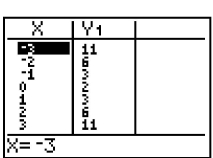
B)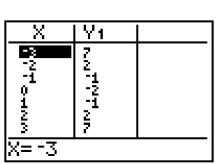 (-3, 11), (-2, 6), (-1, 3), (0, 2), (1, 3), (-3, 7), (-2, 2), (-1, -1), (0, -2), (1, -1),
(-3, 11), (-2, 6), (-1, 3), (0, 2), (1, 3), (-3, 7), (-2, 2), (-1, -1), (0, -2), (1, -1),
(2, 6), (3, 11)(2, 2), (3, 7)
C)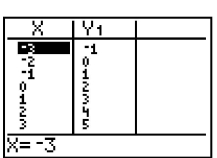
D)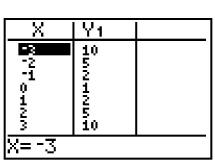 (-3, -1), (-2, 0), (-1, 1), (0, 2), (1, 3), (-3, 10), (-2, 5), (-1, 2), (0, 1), (1, 2),
(-3, -1), (-2, 0), (-1, 1), (0, 2), (1, 3), (-3, 10), (-2, 5), (-1, 2), (0, 1), (1, 2),
(2, 4), (3, 5)(2, 5), (3, 10)
 and list points on the graph.
and list points on the graph.
A)

B)
 (-3, 11), (-2, 6), (-1, 3), (0, 2), (1, 3), (-3, 7), (-2, 2), (-1, -1), (0, -2), (1, -1),
(-3, 11), (-2, 6), (-1, 3), (0, 2), (1, 3), (-3, 7), (-2, 2), (-1, -1), (0, -2), (1, -1),(2, 6), (3, 11)(2, 2), (3, 7)
C)

D)
 (-3, -1), (-2, 0), (-1, 1), (0, 2), (1, 3), (-3, 10), (-2, 5), (-1, 2), (0, 1), (1, 2),
(-3, -1), (-2, 0), (-1, 1), (0, 2), (1, 3), (-3, 10), (-2, 5), (-1, 2), (0, 1), (1, 2),(2, 4), (3, 5)(2, 5), (3, 10)

2
Determine the viewing window used.
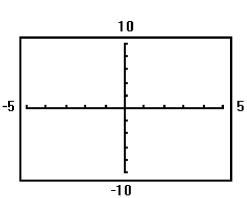
A)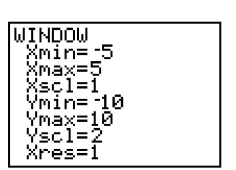
B)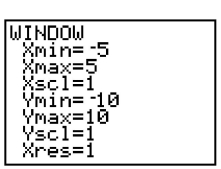
C)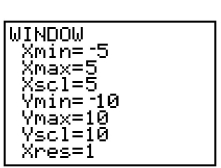
D)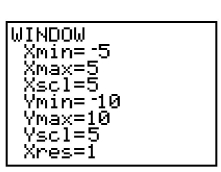

A)

B)

C)

D)


3
Use ZERO (or ROOT)to find the solutions to the equation. Round to two decimal places.

A)x = 1.32, -5.32
B)x = 1.5, -5.46
C)x = 1.18, -5.14
D)x = 1.5, -5.14

A)x = 1.32, -5.32
B)x = 1.5, -5.46
C)x = 1.18, -5.14
D)x = 1.5, -5.14
x = 1.32, -5.32
4
Use ZERO (or ROOT)to approximate the smaller of the two x-intercepts of the equation. Express the answer
rounded to two decimal places.

A)-4.56
B)-0.44
C)0.44
D)4.56
rounded to two decimal places.

A)-4.56
B)-0.44
C)0.44
D)4.56

Unlock Deck
Unlock for access to all 25 flashcards in this deck.
Unlock Deck
k this deck
5
For the equation, create a table,  and list points on the graph.
and list points on the graph.
2x + 3y = 6
A)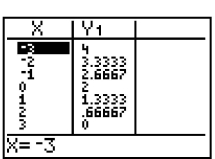
B)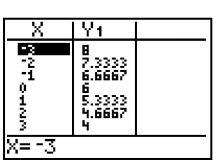 (-3, 4), (-2, 3.33), (-1, 2.67), (0, 2), (-3, 8), (-2, 7.33), (-1, 6.67), (0, 6), (1, 5.33),
(-3, 4), (-2, 3.33), (-1, 2.67), (0, 2), (-3, 8), (-2, 7.33), (-1, 6.67), (0, 6), (1, 5.33),
(1, 1.33), (2, 0.67), (3, 0)(2, 4.67), (3, 4)
C)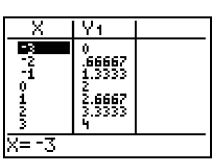
D)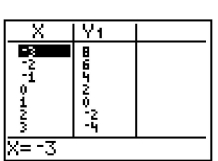 (-3, 0), (-2, 0.67), (-1, 1.33), (0, 2), (-3, 8), (-2, 6), (-1, 4), (0, 2), (1, 0),
(-3, 0), (-2, 0.67), (-1, 1.33), (0, 2), (-3, 8), (-2, 6), (-1, 4), (0, 2), (1, 0),
(1, 2.67), (2, 3.33), (3, 4)(2, -2), (3, -4)
 and list points on the graph.
and list points on the graph.2x + 3y = 6
A)

B)
 (-3, 4), (-2, 3.33), (-1, 2.67), (0, 2), (-3, 8), (-2, 7.33), (-1, 6.67), (0, 6), (1, 5.33),
(-3, 4), (-2, 3.33), (-1, 2.67), (0, 2), (-3, 8), (-2, 7.33), (-1, 6.67), (0, 6), (1, 5.33),(1, 1.33), (2, 0.67), (3, 0)(2, 4.67), (3, 4)
C)

D)
 (-3, 0), (-2, 0.67), (-1, 1.33), (0, 2), (-3, 8), (-2, 6), (-1, 4), (0, 2), (1, 0),
(-3, 0), (-2, 0.67), (-1, 1.33), (0, 2), (-3, 8), (-2, 6), (-1, 4), (0, 2), (1, 0),(1, 2.67), (2, 3.33), (3, 4)(2, -2), (3, -4)

Unlock Deck
Unlock for access to all 25 flashcards in this deck.
Unlock Deck
k this deck
6
Determine the viewing window used.
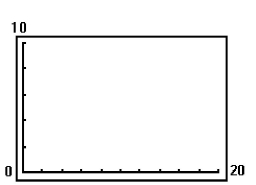
A)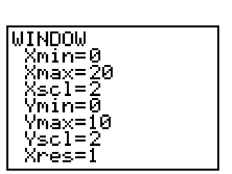
B)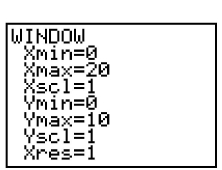
C)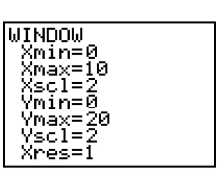
D)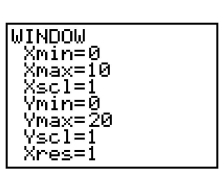

A)

B)

C)

D)


Unlock Deck
Unlock for access to all 25 flashcards in this deck.
Unlock Deck
k this deck
7
Determine the coordinates of the points shown. Tell in which quadrant the point lies. Assume the coordinates are
integers.
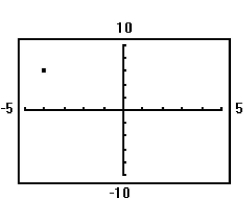
A)(-4, 6); quadrant II
B)(-4, 3); quadrant II
C)(-4, 6); quadrant I
D)(-4, 3); quadrant I
integers.

A)(-4, 6); quadrant II
B)(-4, 3); quadrant II
C)(-4, 6); quadrant I
D)(-4, 3); quadrant I

Unlock Deck
Unlock for access to all 25 flashcards in this deck.
Unlock Deck
k this deck
8
Determine the coordinates of the points shown. Tell in which quadrant the point lies. Assume the coordinates are
integers.
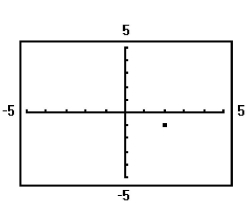
A)(2, -1); quadrant IV
B)(2, -1); quadrant III
C)(2, -2); quadrant IV
D)(2, -2); quadrant III
integers.

A)(2, -1); quadrant IV
B)(2, -1); quadrant III
C)(2, -2); quadrant IV
D)(2, -2); quadrant III

Unlock Deck
Unlock for access to all 25 flashcards in this deck.
Unlock Deck
k this deck
9
Graph the equation using the indicated viewing window.
2x + 3y = 6;X min = -10X max = 10X scl = 2Y min = -8Y max = 8Y scl = 2
A)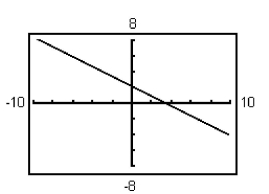
B)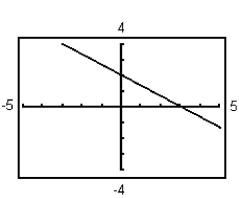
C)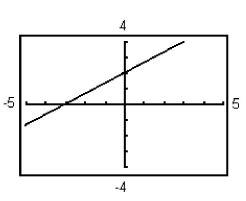
D)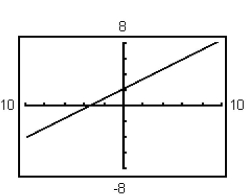
2x + 3y = 6;X min = -10X max = 10X scl = 2Y min = -8Y max = 8Y scl = 2
A)

B)

C)

D)


Unlock Deck
Unlock for access to all 25 flashcards in this deck.
Unlock Deck
k this deck
10
Determine the viewing window used.
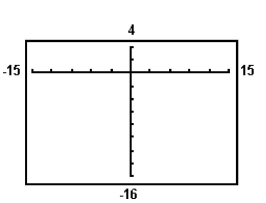
A)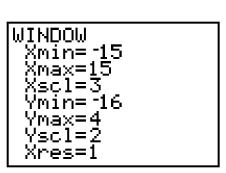
B)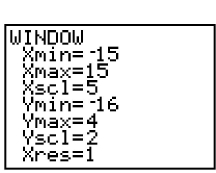
C)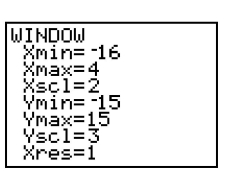
D)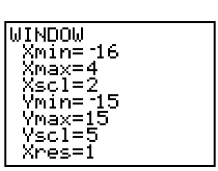

A)

B)

C)

D)


Unlock Deck
Unlock for access to all 25 flashcards in this deck.
Unlock Deck
k this deck
11
Determine the coordinates of the points shown. Tell in which quadrant the point lies. Assume the coordinates are
integers.
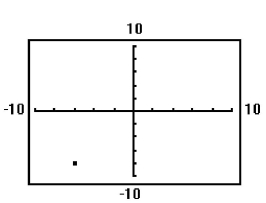
A)(-6, -8); quadrant III
B)(-6, -8); quadrant IV
C)(-6, -4); quadrant III
D)(-6, -4); quadrant IV
integers.

A)(-6, -8); quadrant III
B)(-6, -8); quadrant IV
C)(-6, -4); quadrant III
D)(-6, -4); quadrant IV

Unlock Deck
Unlock for access to all 25 flashcards in this deck.
Unlock Deck
k this deck
12
Select a setting so that the given points will lie within the viewing rectangle.
(-90, 1), (-50, 14), (50, -3)
A)X min = -100 X max = 60
X scl = 10
Y min = -4
Y max = 15
Y scl = 1
B)X min = -4 X max = 15
X scl = 1
Y min = -100
Y max = 60
Y scl = 10
C)X min = -100 X max = 60
X scl = 10
Y min = 0
Y max = 15
Y scl = 1
D)X min = -60 X max = 60
X scl = 10
Y min = -4
Y max = 15
Y scl = 1
(-90, 1), (-50, 14), (50, -3)
A)X min = -100 X max = 60
X scl = 10
Y min = -4
Y max = 15
Y scl = 1
B)X min = -4 X max = 15
X scl = 1
Y min = -100
Y max = 60
Y scl = 10
C)X min = -100 X max = 60
X scl = 10
Y min = 0
Y max = 15
Y scl = 1
D)X min = -60 X max = 60
X scl = 10
Y min = -4
Y max = 15
Y scl = 1

Unlock Deck
Unlock for access to all 25 flashcards in this deck.
Unlock Deck
k this deck
13
Use ZERO (or ROOT)to approximate the positive x-intercepts of the equation. Round to two decimal places.

A)0.94 and 2.18
B)0.87 and 2.21
C)1.19 and 3.44
D)8.39

A)0.94 and 2.18
B)0.87 and 2.21
C)1.19 and 3.44
D)8.39

Unlock Deck
Unlock for access to all 25 flashcards in this deck.
Unlock Deck
k this deck
14
Graph the equation using the indicated viewing window.
y = x + 4;X min = -5X max = 5X scl = 1Y min = -4Y max = 4Y scl = 1
A)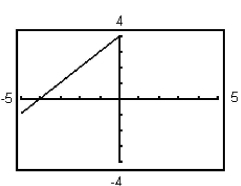
B)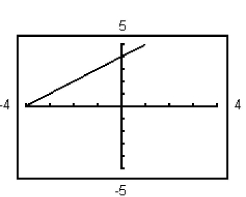
C)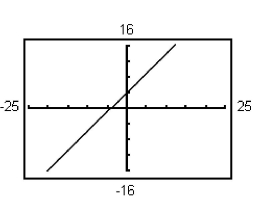
D)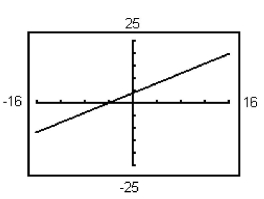
y = x + 4;X min = -5X max = 5X scl = 1Y min = -4Y max = 4Y scl = 1
A)

B)

C)

D)


Unlock Deck
Unlock for access to all 25 flashcards in this deck.
Unlock Deck
k this deck
15
Graph the equation using the indicated viewing window.

A)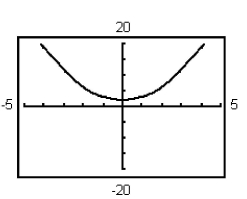
B)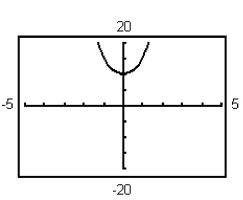
C)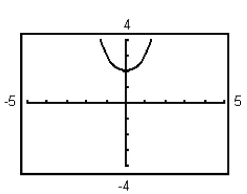
D)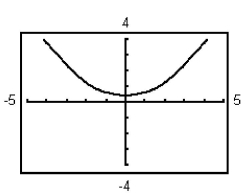

A)

B)

C)

D)


Unlock Deck
Unlock for access to all 25 flashcards in this deck.
Unlock Deck
k this deck
16
Use ZERO (or ROOT)to approximate the positive x-intercepts of the equation. Round to two decimal places.

A)1.83
B)1.76
C)3.83
D)1.91

A)1.83
B)1.76
C)3.83
D)1.91

Unlock Deck
Unlock for access to all 25 flashcards in this deck.
Unlock Deck
k this deck
17
Use ZERO (or ROOT)to approximate the positive x-intercepts of the equation. Round to two decimal places.

A)1.75
B)0.86
C)4.18
D)1.57

A)1.75
B)0.86
C)4.18
D)1.57

Unlock Deck
Unlock for access to all 25 flashcards in this deck.
Unlock Deck
k this deck
18
For the equation, create a table,  and list points on the graph.
and list points on the graph.
y = x + 4
A)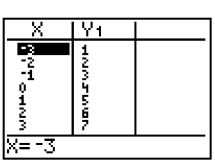
B)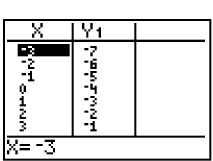 (-3, 1), (-2, 2), (-1, 3), (0, 4), (1, 5), (-3, -7), (-2, -6), (-1, -5), (0, -4), (1, -3),
(-3, 1), (-2, 2), (-1, 3), (0, 4), (1, 5), (-3, -7), (-2, -6), (-1, -5), (0, -4), (1, -3),
(2, 6), (3, 7)(2, -2), (3, -1)
C)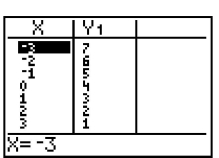
D)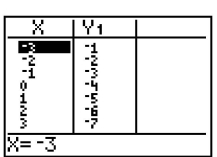 (-3, 7), (-2, 6), (-1, 5), (0, 4), (1, 3), (2, 2), (-3, -1), (-2, -2), (-1, -3), (0, -4), (1, -5),
(-3, 7), (-2, 6), (-1, 5), (0, 4), (1, 3), (2, 2), (-3, -1), (-2, -2), (-1, -3), (0, -4), (1, -5),
(3, 1)(2, -6), (3, -7)
 and list points on the graph.
and list points on the graph.y = x + 4
A)

B)
 (-3, 1), (-2, 2), (-1, 3), (0, 4), (1, 5), (-3, -7), (-2, -6), (-1, -5), (0, -4), (1, -3),
(-3, 1), (-2, 2), (-1, 3), (0, 4), (1, 5), (-3, -7), (-2, -6), (-1, -5), (0, -4), (1, -3),(2, 6), (3, 7)(2, -2), (3, -1)
C)

D)
 (-3, 7), (-2, 6), (-1, 5), (0, 4), (1, 3), (2, 2), (-3, -1), (-2, -2), (-1, -3), (0, -4), (1, -5),
(-3, 7), (-2, 6), (-1, 5), (0, 4), (1, 3), (2, 2), (-3, -1), (-2, -2), (-1, -3), (0, -4), (1, -5),(3, 1)(2, -6), (3, -7)

Unlock Deck
Unlock for access to all 25 flashcards in this deck.
Unlock Deck
k this deck
19
Determine the viewing window used.
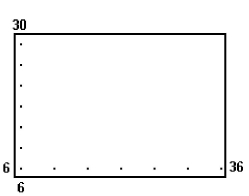
A)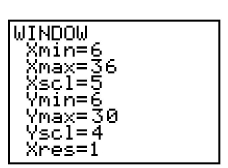
B)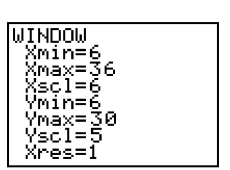
C)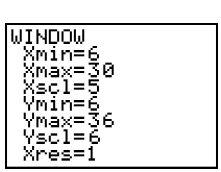
D)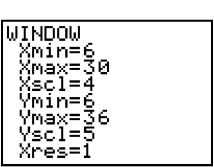

A)

B)

C)

D)


Unlock Deck
Unlock for access to all 25 flashcards in this deck.
Unlock Deck
k this deck
20
Determine the coordinates of the points shown. Tell in which quadrant the point lies. Assume the coordinates are
integers.
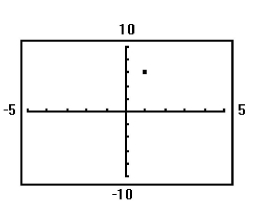
A)(1, 6); quadrant I
B)(1, 6); quadrant II
C)(1, 3); quadrant I
D)(1, 3); quadrant II
integers.

A)(1, 6); quadrant I
B)(1, 6); quadrant II
C)(1, 3); quadrant I
D)(1, 3); quadrant II

Unlock Deck
Unlock for access to all 25 flashcards in this deck.
Unlock Deck
k this deck
21
Use a graphing utility to solve the system of linear equations and give the solution of the system.

A)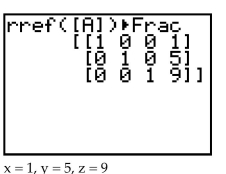
B)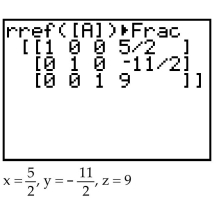
C)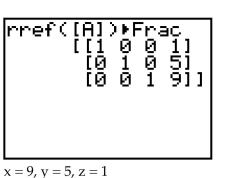
D)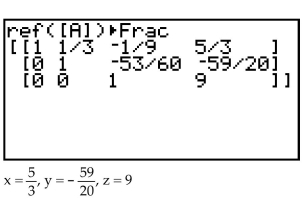

A)

B)

C)

D)


Unlock Deck
Unlock for access to all 25 flashcards in this deck.
Unlock Deck
k this deck
22
Use a graphing utility to graph the inequality.

A)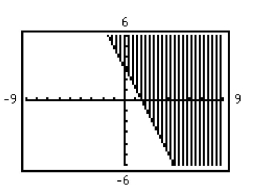
B)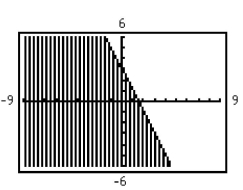
C)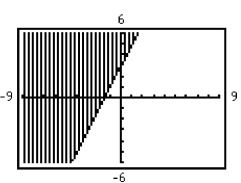
D)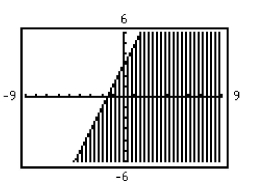

A)

B)

C)

D)


Unlock Deck
Unlock for access to all 25 flashcards in this deck.
Unlock Deck
k this deck
23
Use INTERSECT to find the solution to the equation. Round to two decimal places, if necessary.
6(x - 5)= 2(x - 6)
A)x = 4.5
B)x = 5.5
C)x = -4.5
D)x = -5.5
6(x - 5)= 2(x - 6)
A)x = 4.5
B)x = 5.5
C)x = -4.5
D)x = -5.5

Unlock Deck
Unlock for access to all 25 flashcards in this deck.
Unlock Deck
k this deck
24
Determine whether the given viewing rectangle will result in a square screen.

A)No
B)Yes

A)No
B)Yes

Unlock Deck
Unlock for access to all 25 flashcards in this deck.
Unlock Deck
k this deck
25
Use a graphing utility to graph the inequality.

A)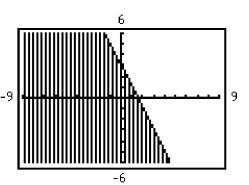
B)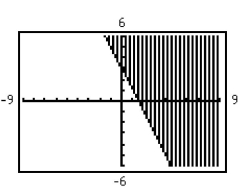
C)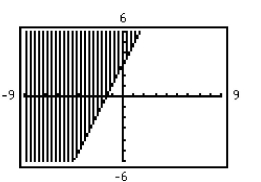
D)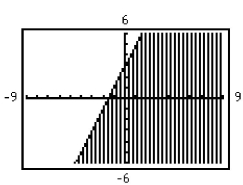

A)

B)

C)

D)


Unlock Deck
Unlock for access to all 25 flashcards in this deck.
Unlock Deck
k this deck


